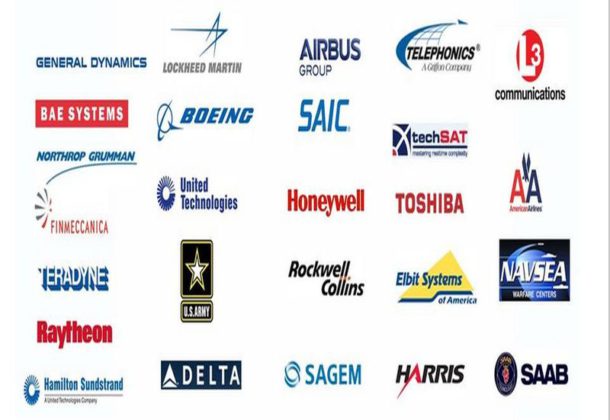
Profit Alone Drives the War Industry,
Leaving Behind Growing Piles of Corpses
Christian Sorensen / War Industry Muster
(May 24, 2021) — Capitalism — the economic system by which a relatively tiny group owns the machinery and factories and enriches itself through hoarding the workers’ surplus value, transforming the natural world into goods and services — is inherently destructive, exploitative, and polluting.
The theoretical physicist Albert Einstein summarized the problem in the May 1949 issue of Monthly Review:
“Private capital tends to become concentrated in few hands, partly because of competition among the capitalists, and partly because technological development and the increasing division of labor encourage the formation of larger units of production at the expense of the smaller ones. The result of these developments is an oligarchy of private capital the enormous power of which cannot be effectively checked even by a democratically organized political society.”
This is true since the members of legislative bodies are selected by political parties, largely financed or otherwise influenced by private capitalists who, for all practical purposes, separate the electorate from the legislature. The consequence is that the representatives of the people do not in fact sufficiently protect the interests of the underprivileged sections of the population.
Moreover, under existing conditions, private capitalists inevitably control, directly or indirectly, the main sources of information (press, radio, education). It is thus extremely difficult, and indeed in most cases quite impossible, for the individual citizen to come to objective conclusions and to make intelligent use of his political rights.”
This is the environment in which the war industry operates. The US government serves corporate interest. And corporations, by design, strive to maximize profit. The profitable nature of war is what propels the military-industrial-congressional complex.
The military-industrial-congressional complex (MIC) is an insulated authority consisting of the US military establishment, headquartered in the Pentagon; the war industry, the corporations that market and sell goods and services to the US military, intelligence agencies, and allied capitalist regimes; and Capitol Hill, the elected representatives who fund the military and pass legislation abetting the permanent warfare state.
The US financial industry, including investment banks, asset management firms, and private equity firms, sits at the top of the war industry. Investment banks and asset management firms hold the majority of shares in nearly every major war corporation. (The notable exceptions are Sierra Nevada Corporation and General Atomics, two private corporations run by billionaires: Fatih & Eren Ozmen and the Blue brothers, respectively.)
The other way that US finance dominates the war industry is by outright ownership of war corporations. This can be seen in the private equity firm Lindsay Goldberg’s ownership of the corporation Amentum, whose services include administering prepositioned matériel, maintaining military aircraft, and training helicopter pilots.

“Investment banks and asset management firms
hold the majority of shares in nearly
every major war corporation.”
The troops — the average soldier, sailor, airman and Marine — are not part of the MIC. From a military and congressional perspective, the troops are pawns deployed to help pry open countries to foreign investment, to ensure the free flow of natural resources and to threaten and implement violence against any government or group that resists Washington’s machinations. From an industry perspective, the troops are vessels to use the war industry’s goods and services and occupy the military bases through which industry routes further goods and services.
The only uniformed military personnel who are part of the MIC are the high-ranking generals and admirals. The troops themselves enlist in the US Armed Forces largely for economic reasons (though it can be comfortable for them to couch their participation in traditionally patriotic terms), as donning the military uniform offers one of the few well-paying jobs remaining in an economy that Wall Street and Washington have systematically gutted through the implementation of neoliberal economic policies.
These policies decrease government monitoring and regulation of corporate activity; cut government spending on healthcare, education, and public infrastructure; export and automate jobs; and sell off such government assets and services as schools, transportation, and public utilities. Both capitalist political factions, the Republican and Democratic parties, abide by and promote such policies. The US war industry thrives in Washington’s embrace of neoliberalism.

Calling themselves “defense contractors,” war corporations do more than design and pitch products. They also fabricate, test, evaluate, qualify, assemble, market, inspect, package, deliver, sustain, maintain, upgrade, monitor, and redesign products — all billable activities. Additionally, war corporations regularly bill their military customers for such services as configuration management, contractor logistics services, data, documentation, engineering, incidental materials, integration, logistics, management, operational security, parts, production costs, revitalization, spares, support equipment, technical services, and training.
To make more money, more and more goods and services must be conceived, marketed, and sold.
The third scheme is pushing for noncompetitive contracts. When the Pentagon solicits proposals using an open, competitive bidding process, corporations compete to deliver decent services at cheaper prices. Noncompetitive contracts garner greater profits.
Furthermore, many major contracts that are awarded through nominally open and free competition are not functionally open or free; only a handful of corporations have the technology and financial clout to place a legitimate bid. In order to obtain noncompetitive contracts, corporations masterfully exploit the Federal Acquisition Regulation (FAR), the rulebook that sets out the parameters by which the US government can purchase goods and services.
The fourth scheme is piling additional modifications onto a supposedly straightforward contract. Years into a contract with a war corporation, a lone Pentagon official might step back and marvel at how the provision of a simple good has metastasized into a ballooning multiyear project that incorporates disparate services and a variety of funding sources.
The fifth and final scheme is the sale of consumables. Products produced by war corporations ought to be repaired. But many industry products are pushed as consumables instead of reparables. In other words: use it, discard it, and then buy a new product, instead of using it and repairing it.

In parallel, corporations require many goods sold as reparables to be regularly scheduled for repair, regardless of whether the good actually needs to be repaired at that point. Collectively, these schemes produce contract after contract caring for industry’s profits, not military need.
Secrecy is the MIC’s chainmail. Military and industry classify information (e.g. Confidential, Secret, Top Secret) in order to keep weapons systems secret but also to keep the public ignorant of government criminality, the scope of the surveillance state, the full costs of war, and fraud, waste and abuse. Classifying information prevents the public from understanding and acting against entrenched, costly militarism.

Marillyn Hewson, CEO of Lockheed Martin, at White House meeting.
Funding It
The military-industrial-congressional complex is expensive. Brown University’s Costs of War project estimates that $6.4 trillion has been allocated to post-9-11 US “homeland security” and wars in Iraq, Afghanistan, Pakistan and Syria through fiscal year 2020. William Hartung and Mandy Smithberger have calculated that roughly $1.25 trillion was spent in 2019 on war and sundry “national security” costs.
It is estimated that less than an annual $300 billion could end world hunger, and roughly $240 billion could pay for primary and early secondary education for the world’s population.
Many corporations receiving money from the Pentagon (e.g. AECOM, Amazon, Honeywell, IBM) do not pay their fair share of taxes, according to the Center for Public Integrity and Fortune. The Institute on Taxation & Economic Policy issued a report in December 2019, which cited 91 US-based corporations that did not pay any federal income taxes on their 2018 domestic income.
This irresponsibility is part of a wider pattern wherein the ruling class shirks social responsibility: The richest 400 families in the US paid a lower share of the tax burden in 2018 than any other income range, as Emmanuel Saez and Gabriel Zucman document in their 2019 book The Triumph of Injustice.
“Classifying information prevents the public from
understanding and acting against
entrenched, costly militarism.”
The tax burden falls on the working class. The working class in the United States pays higher taxes relative to the working class in other industrialized nations but is not granted the social safety net that usually comes with high taxation, as an analysis in Jacobin has demonstrated. And, of those taxes that workers pay, more tax dollars go to war corporations than the troops’ needs.
The US government pays for industry’s goods and services with taxdollars and money raised from selling Treasury marketable securities. From this, the US military has dozens of different funding buckets to pay for goods and services. Popular funds include working capital funds, operations & maintenance funds, procurement funds, and research, development, test, and evaluation funds.
The government has a long-standing policy that guides military units of all sizes to spend their budgets by the end of the fiscal year. If military units spend all of their money, they are typically allocated the same amount of money or more in the next budget appropriation. However, if they economize, find savings, or do more with less, they likely see their budgets cut in the next appropriation. This policy, often called “use it or lose it,” does not incentivize fiscal responsibility.
It gets worse. The Defense Finance & Accounting Service is the military’s primary financial management arm. A 2013 Reuters investigation by Scot Paltrow concluded that DFAS implements monthly “unsubstantiated change actions” — illegal, inaccurate “plugs” — that forcibly make the War Department’s books match Treasury’s books:
“Fudging the accounts with false entries is standard operating procedure… Reuters has found that the Pentagon is largely incapable of keeping track of its vast stores of weapons, ammunition and other supplies; thus it continues to spend money on new supplies it doesn’t need and on storing others long out of date. It has amassed a backlog of more than half a trillion dollars… [H]ow much of that money paid for actual goods and services delivered isn’t known.”
DFAS cooks the books, and the Pentagon’s high-ranking officers and civilian leaders are complicit. Since the public has no true idea of how much money the Pentagon is wasting, the Pentagon is able to ask Congress every year for more and more money, in brutal contempt of soldierly efficiency and military necessity.
In recent years, the Pentagon has hired Corporate America to audit its books. The US military has yet to pass the audit. The audit is ongoing and quite costly.
The main role of the federal government under capitalism is to maintain the capitalist economic system and set the general conditions by which large corporations and billionaires are able to accrue more and more profit. The aforementioned military and congressional activities — substantial spending on the war industry’s goods and services, namely — demonstrate that the federal government is indeed fulfilling its main role under capitalism.
Federal departments are encouraged to allocate nearly one quarter of their procurement funds to small businesses. The US military establishment dishes out more money to small businesses than any other government department or agency. All sides of the MIC are bound symbiotically in the small business game:
The Pentagon fast-tracks contracts and militarizes greater portions of the economy, industry gets noncompetitive contracts, and Congress spouts “jobs” rhetoric, placating and misleading some within the working class.
Additionally, “small” businesses can be quite big, including corporations with over $100 million in contracts with the military or corporations with hundreds of employees. Corporations have been known to hold on to Small Business classification even though they are now larger than “small.” Awarding numerous contracts annually to small businesses, genuine or posers, militarizes the economy, further trapping the country in the costly permanent warfare state.
This is the first in a series of five articles about the military-industrial-congressional-complex. Christian Sorensen is an independent journalist mainly focused on war profiteering within the military-industrial complex. An Air Force veteran, he is the author of the recently published book, Understanding the War Industry. He is also a senior fellow at the Eisenhower Media Network (EMN), an organization of independent veteran military and national security experts. His work is available at War Industry Muster.